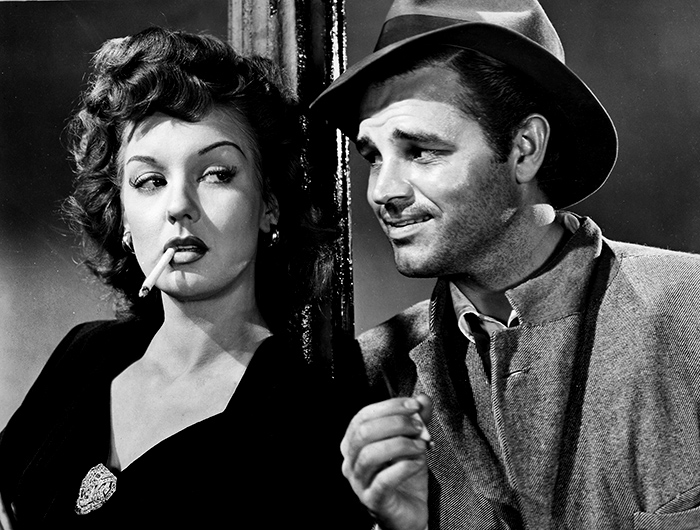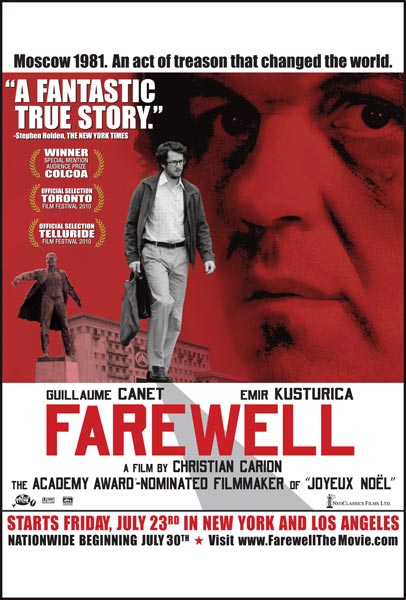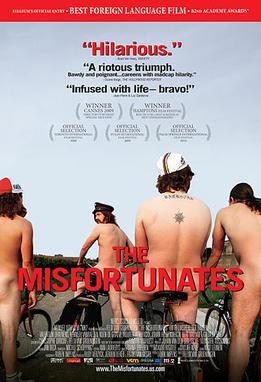Page contents:
Detour (1945) / Green Zone (2010 ) / She's out of my league (2010) / Farewell (2009) / The Great Raid (2005) / The Bothersome Man (2006) / The Crying Fist (2005) / The Misfortunates ( 2009) / Pierrepoint: The Last Hangman (2005) / Inheritance (2006) / The Ghost Writer (2010) / Time out (2001) / Chinese Roulette (1976)/ Fear and Trembling (2003) / The Accidental Tourist (1988)
Detour (1945)

The Perils of hitchhiking
Our hitchiker, Al Roberts is a bit off; a dyed in the wool complainer that would have given Melvin Rudell from "As good as it gets" a run for his money as one the crabbiest movie characters ever. He's constantly bemoaning his unlucky lot in life and the vagaries of fate, as if the big man upstairs was deliberately yanking his chain. Although, I think that if he stumbled across a million dollars, he'd gladly find some trick of fate to let all that loot slip through his fingers, then gripe about big time for the rest of his life.

The interesting thing about this B movie is the entire time-line of this film noir is only about, give or take 10 minutes long; the time it takes for a hobo to come in from the cold, nurse a cup of coffee for as long as he can inside a warm roadside diner then head back out to the highway and start hitchiking again. That's about it. The entire story is told in a flashbacks and voice-overs. While inside the diner, a trucker asks him where he's going, He says He's heading East, meaning everything has already happened and he's now on the lam.
"Hey, Glamorous, give me change for a dime!" The trucker pops a nickel in the jukebox and plays a love song that immediately sets Roberts off, reminding him about a failed love affair that sent him hitchhiking from the New York to Los Angeles in the first place.
And since it's all his (mangled?) version of the facts; this is where all the tension of the film comes from, is he being honest or is he lying to the audience? I found myself gradually transposing myself into that theorical jury box that would sit in judgement over him and I would have gladly put the rope around his neck---or as one of the characters says: " I'd let him sniff some of that perfume Arizona passes out free to murderers". His version of what happened is so fantastical as not to be believed. He opened the car door and a man fell out and dashed his head against a stone, expiring himself during a rain storm? Or He was tugging on the end of a telephone line outside her room, without knowing it had gotten tangled around her throat due to her drunken state and thus accidently strangled the poor wench? Roberts could be telling the truth or he could also a classical example of the unreliable narrator. Since the idea he and his girl were planning to be married; but she abruptly called it off mere days before their wedding to head out to Hollywood and try her luck as a singer/actress, is a large hint that that great romance existed only in his own mind.
Detour was a low budget quickie that was shot in only six days, but it's oddness, inconsistency and continuity goofs only add to the film. It has flashy dialogue, colorful lines and a great femme fatale. And in a bizarre twist, later in life, the star of the film, Tom Neal actually knocked off his one of his wives in real life and only missed the electric chair by the slimmest of chances.
Detour ~ 7/10
Detour (1945) / Green Zone (2010 ) / She's out of my league (2010) / Farewell (2009) / The Great Raid (2005) / The Bothersome Man (2006) / The Crying Fist (2005) / The Misfortunates ( 2009) / Pierrepoint: The Last Hangman (2005) / Inheritance (2006) / The Ghost Writer (2010) / Time out (2001) / Chinese Roulette (1976)/ Fear and Trembling (2003) / The Accidental Tourist (1988)
Detour (1945)

The Perils of hitchhiking
Our hitchiker, Al Roberts is a bit off; a dyed in the wool complainer that would have given Melvin Rudell from "As good as it gets" a run for his money as one the crabbiest movie characters ever. He's constantly bemoaning his unlucky lot in life and the vagaries of fate, as if the big man upstairs was deliberately yanking his chain. Although, I think that if he stumbled across a million dollars, he'd gladly find some trick of fate to let all that loot slip through his fingers, then gripe about big time for the rest of his life.

The interesting thing about this B movie is the entire time-line of this film noir is only about, give or take 10 minutes long; the time it takes for a hobo to come in from the cold, nurse a cup of coffee for as long as he can inside a warm roadside diner then head back out to the highway and start hitchiking again. That's about it. The entire story is told in a flashbacks and voice-overs. While inside the diner, a trucker asks him where he's going, He says He's heading East, meaning everything has already happened and he's now on the lam.
"Hey, Glamorous, give me change for a dime!" The trucker pops a nickel in the jukebox and plays a love song that immediately sets Roberts off, reminding him about a failed love affair that sent him hitchhiking from the New York to Los Angeles in the first place.
And since it's all his (mangled?) version of the facts; this is where all the tension of the film comes from, is he being honest or is he lying to the audience? I found myself gradually transposing myself into that theorical jury box that would sit in judgement over him and I would have gladly put the rope around his neck---or as one of the characters says: " I'd let him sniff some of that perfume Arizona passes out free to murderers". His version of what happened is so fantastical as not to be believed. He opened the car door and a man fell out and dashed his head against a stone, expiring himself during a rain storm? Or He was tugging on the end of a telephone line outside her room, without knowing it had gotten tangled around her throat due to her drunken state and thus accidently strangled the poor wench? Roberts could be telling the truth or he could also a classical example of the unreliable narrator. Since the idea he and his girl were planning to be married; but she abruptly called it off mere days before their wedding to head out to Hollywood and try her luck as a singer/actress, is a large hint that that great romance existed only in his own mind.
Detour was a low budget quickie that was shot in only six days, but it's oddness, inconsistency and continuity goofs only add to the film. It has flashy dialogue, colorful lines and a great femme fatale. And in a bizarre twist, later in life, the star of the film, Tom Neal actually knocked off his one of his wives in real life and only missed the electric chair by the slimmest of chances.
Detour ~ 7/10
Last edited by thracian dawg; 11-06-21 at 01:50 PM.








 Hadn't heard of this
Hadn't heard of this